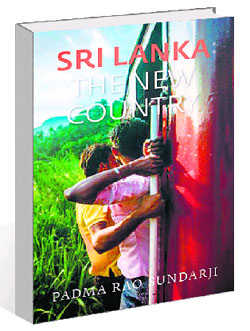
Sri Lanka: The New Country by Padma Rao Sundarji. Harper Collins. Pages 320. Rs 374
Sandeep Dikshit
For over 30 years, Sri Lanka attracted the best of spies, journalists, NGOs and arms suppliers as differences between Tamils and Sinhalas deteriorated into an armed conflict. The war ended in May 2009 with the killing of the top LTTE leadership and tens of thousands of civilians. The West is convinced that the Sri Lankan army wantonly gunned down civilians and surrendering LTTE cadres, and wants it to pay. Lankan diplomats such as Prasad Kariawasam and Mahishini Colonne, mentioned in the book, have maintained LTTE’s brutality was replied by firm-handedness and incidents of cold-blooded murder by the army were by a few rogue elements.
This book is the story of Sri Lanka of the last 15-odd years, slowly emerging from a war, and Padma Rao Sundarji is firmly in Colombo’s corner. She begins by challenging claims of impartiality by European media houses. ‘Is it fair to foist it on readers by manipulating an honest report just because it tells a different story?’ she asks. Was it the same reason why her peers in journalism like Robert Fisk opted to join The Independent, Leslie Cockburn works freelance on her famed documentaries and Glenn Greenwald founded The Intercept?
Padma asks readers to scroll down ‘Canada human rights’ on any search engine and then judge the merit of Ottawa sheltering LTTE activists on human rights considerations. And she wonders why with their take-no-prisoners approach in Libya, Iraq and Afghanistan, western countries facilitated breathing space in the past to LTTE, allowing it to regroup, or are now bent on making Sri Lanka to atone for the large-scale killings of civilians in the military defeat of LTTE in 2009.
All along, she swats the western dominated account — similar to that by Tamil Nadu politicians who also get sideswiped — about the last days of the war. Their ‘hagiography’ of LTTE is stripped by statistics — its suicide bombings were more than the Hezbollah and the Hamas put together — and by accounts of suffering by those the LTTE forcibly conscripted.
The value of peace is brought about by a comparison between her war-time visits and the last one last year. From the lush flora where land was once barren and mined, to narrating the saddest flight she took in 2009, sharing space with two-dozen mutilated youth writhing in agony and often crying after catching the sight of one or the other coffins containing the remains of their friends.
There is ample space to the Sri Lankan Army for its version of the large-scale deaths in 2009, but the constant upbeat account of its civic activities and sustained demonisation of the LTTE begins to lose credibility when juxtaposed against Nirupama Subramanian’s Sri Lanka: Voices From a War Zone, K M De Silva’s Reaping the Whirwind and from the other side, Armed Struggle and Peace: Efforts of Liberation Tigers by Anton Balasingham, which revealed how the army was singularly responsible for stoking one of the four Eelam Wars.
Padma prefers an individual-centric approach in bringing out the story of northern and eastern Sri Lanka five years after the war ended and how the Sri Lankan armed forces slowly re-established their monopoly on force.
To non-aficionados of a country’s political history, who have only heard of Sri Lanka’s casinos and hotels in the south west, the book paints the country in its changing colours of the sky, the forests, the beaches and the flat salt pans of Elephant Pass, where battles to the last man were fought to cut off Jaffna from the mainland.
Journalists and professional drivers are the best in identifying top-class highway eating joints. That should be a reason to follow her trail across the nation from Colombo to Jaffna on the A-9. In the many interesting detours to meet the survivors, her persistence gets them to peel their past and lay open the present. But what we don’t get is an account of the submerged anger, at least among some Tamil survivors. Their views need to be reflected to understand the future of this region in case Colombo is unable to grant Northern Province Tamils innocuous things like control over the police and land, more jobs and a sympathetic attitude towards their language and lifestyle. These are collectively known as ‘izzat’ (respect) and their continual denial leads to potent dissatisfaction that is difficult to tamp down.



























